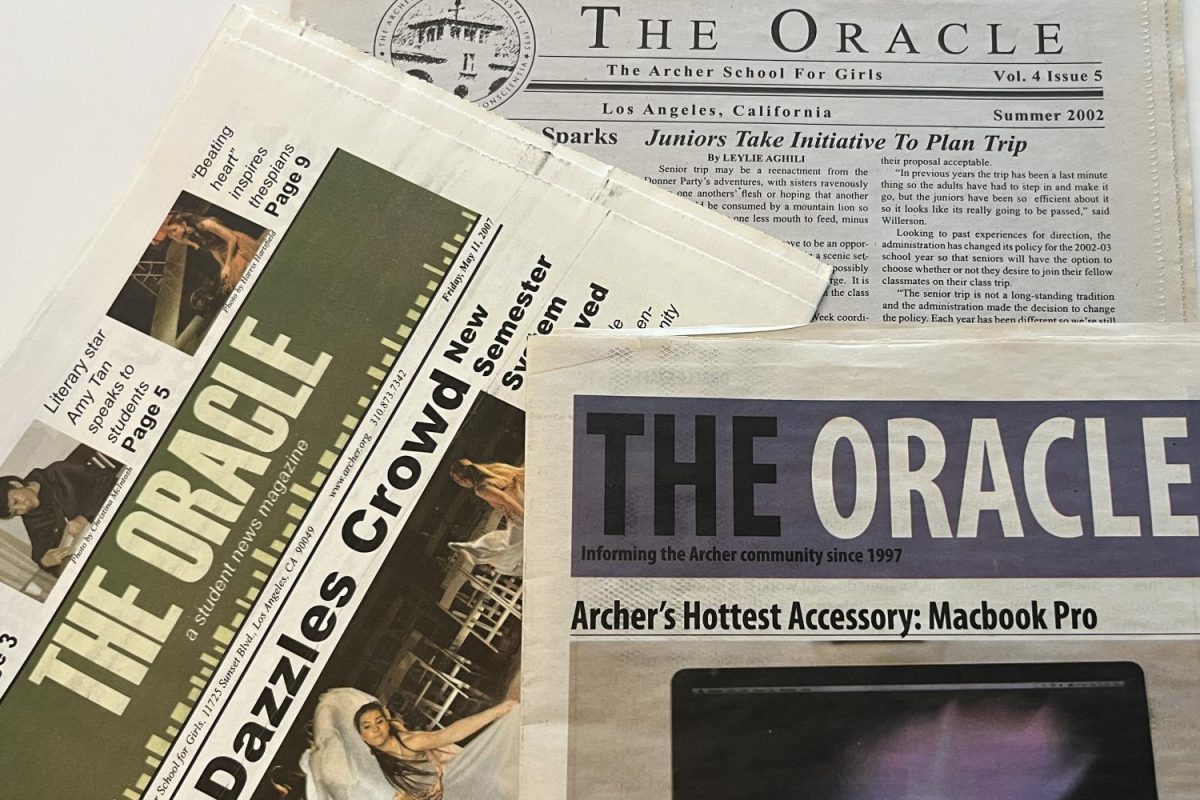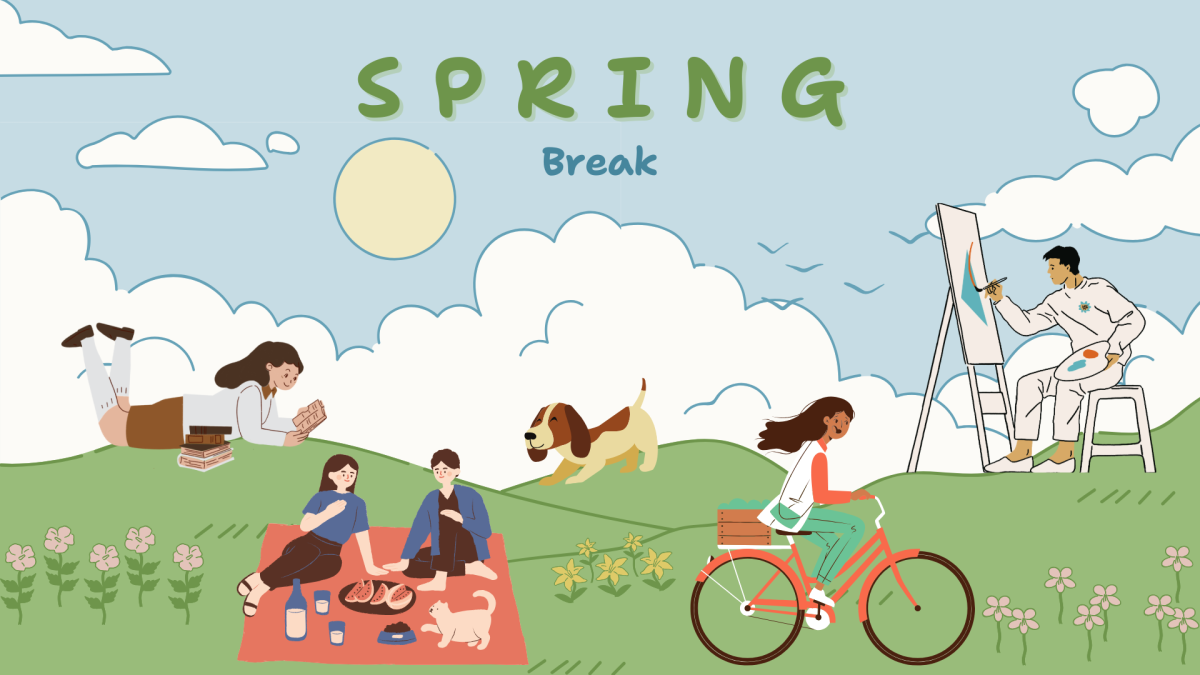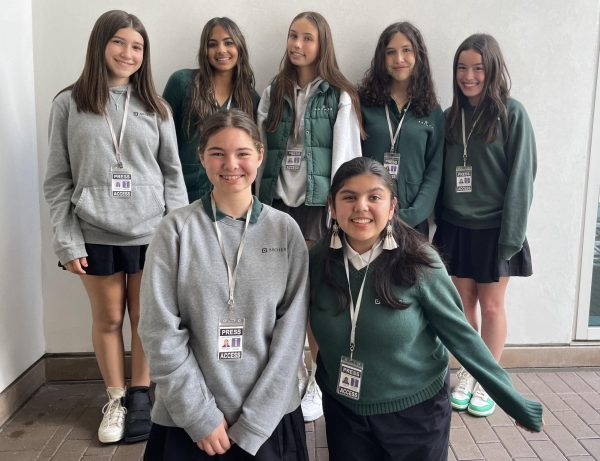From a small lunch club to a nationally award-winning online newspaper, The Oracle has transformed greatly over the last 23 years, while always staying true to its principle values.
We believe that looking back at The Oracle’s journey has helped us to reflect upon our role in the Archer community. It also helped us realize our goals for the future, such as furthering our connection with the larger community and expanding our publication with multimedia reporting and a new podcast program.
Created in 2001, The Oracle started off as a print newspaper, with the staff releasing a few volumes each year. It was an official class until the journalism teacher left Archer, and then it became a club. In the 2011-2012 school year, our current journalism adviser Kristin Taylor became English department chair and inherited The Oracle with minimal experience.
“I had written a column for my college newspaper, but that was the extent of my knowledge. I didn’t know any of the rules of journalism,” Taylor said. “I did grow up reading the paper and being exposed. My father and my mother always had newspaper subscriptions … So I knew there was a value to newspapers but knew nothing about them.”
By 2011, The Oracle was a tiny club. The first year Taylor advised the publication, it remained a print newspaper. However, beginning her second year, The Oracle transitioned to an online format. The 2013-2014 school year was the first year The Oracle became a class. This was also the first year that Taylor took students to the JEA/NSPA National High School Journalism Convention.
“I was really falling in love with it as I was teaching myself about it,” Taylor said. “The first year, I literally just asked people who are interested in being editors to learn alongside me and take that next step. We didn’t have any of the processes or level of quality control back then.”
After learning about a two-week teacher fellowship at the convention, Taylor was accepted to the program at Kent State University, where she studied under the guidance of veteran journalism advisers. This inspired her to begin working on her journalism master’s degree from Kent State University, which has a unique online program aimed at journalism educators.
In the years that followed, Taylor also joined JEA’s scholastic press rights committee and was later elected scholastic press rights director in 2020.
The 2015-2016 school year was a turning point for The Oracle. For the first time, The Oracle won the National Scholastic Press Association Pacemaker Award, which recognizes “overall excellence and distinguishes the top student media produced during a school year.”
“There was this sense of pride, ownership and excitement among the journalism students,” Taylor said.
English Department Chair Brian Wogensen has been an English teacher at Archer for the past 24 years, since The Oracle’s founding. Wogensen said, over the past decade, he has seen The Oracle become integrated into the educational culture at Archer.
“Not only did the paper become much more dynamic, but I think The Oracle now feels to me like it’s integrated,” Wogensen said. “I use some of the articles in class when we are analyzing rhetoric. It informs assessments that we do in class. It’s a lot more woven into the fabric of the academic world of Archer in a way that it didn’t used to be.”
American newspaperman Philip L. Graham famously said that “journalism is the first rough draft of history.” Similarly, The Oracle is the first rough draft of Archer’s history, serving as an invaluable chronology of student life.
Taylor said she believes The Oracle has become a platform where students feel seen. Progressively, throughout the past 10 years, The Oracle has created practices and policies to promote ethical and diverse reporting. We track our sources to diversify and balance student voices. Additionally, we run an annual staff diversity audit and cover complex topics that may be considered controversial.
We also utilize Trello and a deadline spreadsheet to maintain timely, quality content. Each story on our website goes through many rounds of edits. At minimum, one section editor, the editor-in-chief and our adviser will leave feedback. These organizational systems are incredibly advanced compared to the systems The Oracle initially had in place.
We believe The Oracle is so successful because of the one-of-a-kind community and environment that Taylor and the past editorial boards have fostered. For example, our monthly whole-staff meetings allow us to create strong bonds and a sense of community. We also practice “share the love,” a tradition where at the beginning of class, we shout out other staff members for their efforts.
“It’s a culture of compassion, love and family. It’s a community where people celebrate each other’s successes in a way that I don’t always see,” Taylor said. “Here, it’s not just about a competition of me versus the person next to me. It’s much more a sense of we’re a team, and what we do as a team matters.”
When we were in the Introduction to Journalism class, we spent weeks learning about the importance of the First Amendment, court cases in which press freedom was threatened and the dangers of censorship. Archer has won the First Amendment Press Freedom Award nine consecutive years, and we are grateful for the support of our administration.
Taylor said The Oracle has gained significant respect and viewership from our community.
“I think because the program has won so many awards and because it’s now something that the administration talks about as one of our signature programs, one of Archer’s proudest programs, there is a prestige to it,” Taylor said.
Technology has allowed The Oracle to grow and reach a larger audience. We utilize social media accounts on Instagram, Facebook and TikTok to share our work and student voices. We also send a weekly newsletter to the community, which contains the stories published in the previous week.
While The Oracle has undergone several changes and a major expansion throughout the years, our core mission has and will remain the same: to amplify student voices.

















